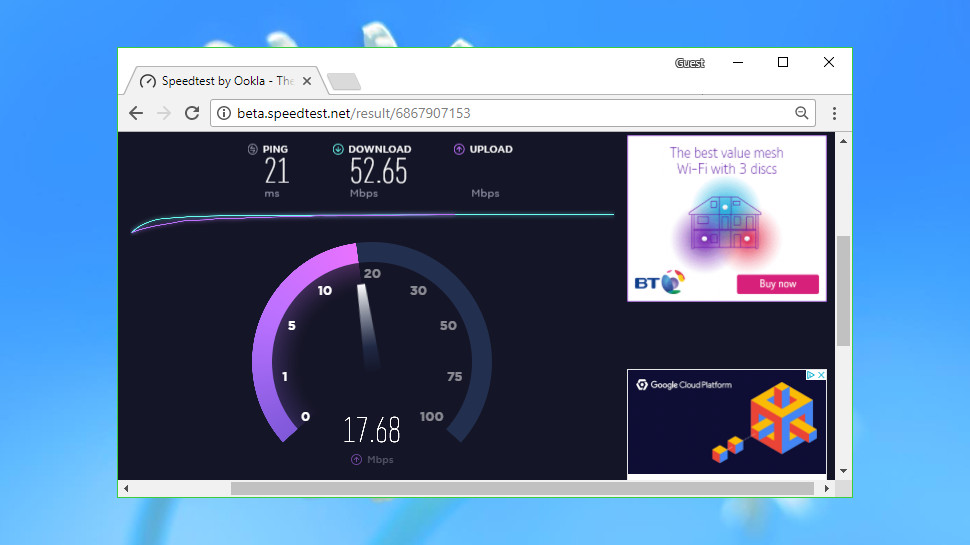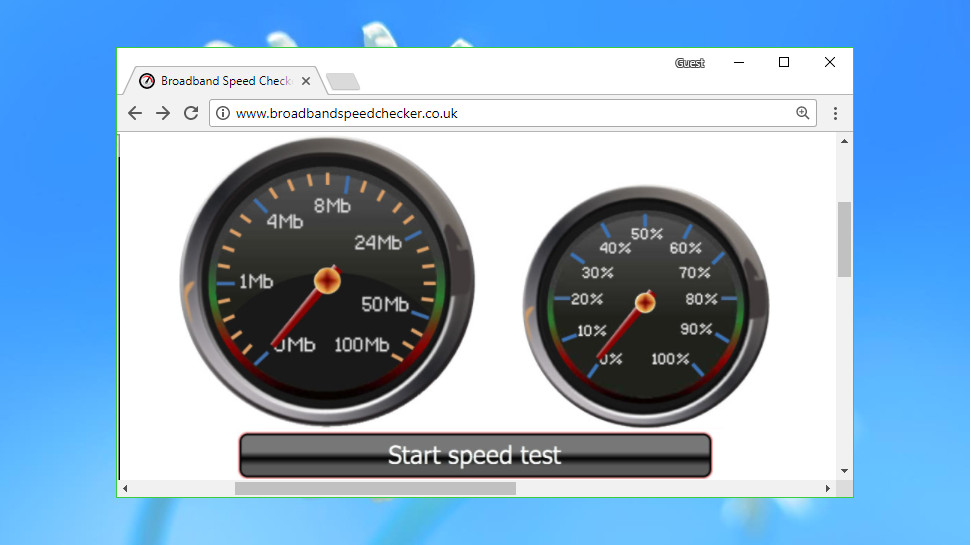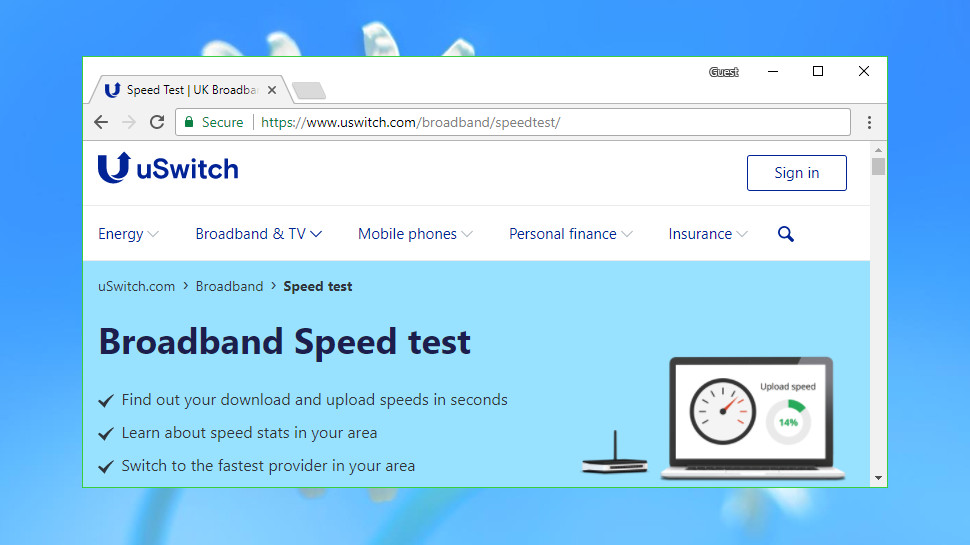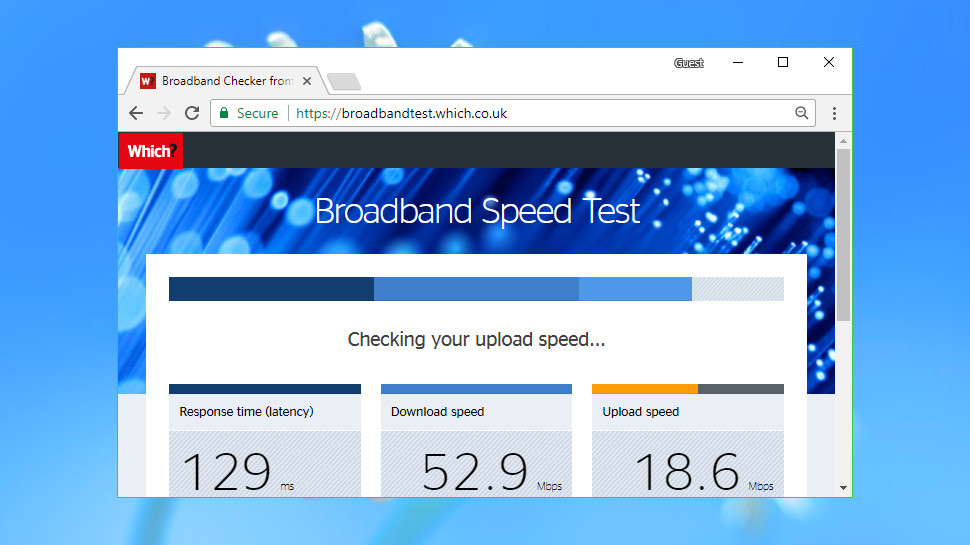Can you trust VPN speed tests?
Measuring VPN speeds can be difficult. Here's why…
Using the best VPNs bring all kinds of benefits. You're protected on public Wi-Fi, more anonymous online, it's more difficult to track what you're doing, and you can bypass geographical blocks to access the sites you need.
There's also a performance price to pay, mostly due to the extra work a VPN adds to your internet access. All your traffic must be encrypted, maybe even twice, then routed through an intermediate VPN server (perhaps thousands of miles) away before finally heading off to your destination.
In some cases, using a VPN can actually improve your download speeds : this is because certain ISPs will sometimes try to ‘shape’ your bandwidth by deliberately slowing down certain types of traffic like streaming video or P2P downloads. As all VPN traffic passes through an encrypted tunnel, if you’re using a VPN that’s been correctly set up, your ISP will have no idea exactly what type of content you’re accessing, so will not know what to slow down.
In the nature of things though, routing your traffic through another computer before connecting to the internet does take extra time. Sometimes it’s only a little. Other times it’s by a huge amount.
How can you calculate this exactly? Just about every VPN reviewer – including us – will try to help you find out by carrying out their own series of speed tests.
These reports can be very detailed, maybe with upload speeds, download speeds, latencies and more. But how much can you trust the individual figures, and what do they really mean to you?
Be prepared
Unpicking the results of a VPN speed test starts by understanding how it works, and what this is actually telling you.
First and foremost, most people who complain about slow internet tend to use WiFi. Connecting to the internet via wireless is very common but many things can affect your connection speed. Some of these are obvious like how close you are to the router and whether there’s anything blocking the signal.
Other factors include your router type, how many other devices are connected to the internet and the type of wireless encryption you use.
The bottom line is that if you want any chance of an accurate test of what your connection speed is like both and without a VPN, you’ll need to use a computer, wired to your router. If your machine is too far away from the router, you can use the powerline networking in your home or office to connect the two, with the help of special devices.
It stands to reason that you should also shut down any other devices which are using your home network, as well as any running apps besides the ones necessary for your speed check
Test issues
Believe it or not the best way to measure your broadband speed is to run some kind of speed check . This is usually done through a web-based service like speedtest.net – without the VPN, then repeating it with the VPN connected to one or more locations, and reporting any differences.
This is simple enough to do, and can be accurate if you test using multiple sites, but there are lots of points to consider.
Issue number one is the starting location. We connect to a VPN from the UK, for instance, which usually has several fast servers available.
You may see very different results if you're connecting to the service from another country with its own level of servers and connectivity.
The situation is complicated still further by your speed testing website itself. If it’s servers aren’t based close to you, this will also affect your broadband speed check. This is why you should either find a speed testing website that offers multiple servers in different countries or ones that’s definitely based in your home country.

The next variables are the server locations being tested. If the reviewer isn't connecting to the countries you want to use, you're left to guess what this might mean. Terrible speeds from the UK to Netherlands could be interesting, but they don't necessarily mean you'll see the same when you access servers in France and Germany.
Even if the test results were 100% accurate for the server locations tested, keep in mind that they can only measure speeds at any one given moment in time. These could be influenced by factors like the load on the reviewer's internet connection, how busy their ISP might be, maybe a temporary issue on the VPN server being accessed, or an overloaded test server.
Say we get lucky: there are no other factors involved and our figures really do represent VPN performance for the routes we've measured. That's great, but it could change tomorrow if the VPN adds a new server, upgrades its bandwidth, or perhaps drops its prices and sees thousands of new users arrive to overload the service.
Similarly if the testing website decides to add a new server or other people don’t happen to be using it when you test, you may see an improvement in connection speed which has nothing to do with your home connection or VPN provider.
This doesn't mean you should give up on speed tests entirely. If they consistently show one VPN is three times the speed of another, for instance, that's probably information worth knowing. Just treat the results as a broad indicator rather than the absolute truth.

OS and protocols
The setup of your device itself can also affect your perceived connection speed. In theory your chosen operating system has nothing to do with how fast your broadband is, but a particularly sluggish or speedy machine might skew your results.
For instance in our tests we used a Windows 11 virtual machine :this has a separate software network interface, so won’t perform as fast as a regular PC. Even if you do use a normal computer, running processes like Windows Update can also hog your bandwidth, affecting results.
One way to get around these kind of issues is to run your speed test from a web browser in a ‘live’ Linux environment. You can boot these easily from a USB disk without affecting the data on your hard drive.
Your chosen VPN Protocol also will affect your connection speed. In our tests, for instance, we used NordVPN’s own ultramodern ‘Nordlynx’ protocol. It’s based on Wireguard, which is much more efficient than older protocols like OpenVPN. As such, NordVPN’s own benchmarks clock it as extremely fast relative to other protocols but even it acknowledges the difficulty of accounting for every single metric in their tests.
Extended benchmarks
Some services and websites claim they can offer better and more accurate benchmarks of VPN speeds. There's some truth in that, too, although the end results may still not help you very much.
Suppose we set up five testing locations, for instance, based in the UK, US, India, Brazil and Australia. At regular intervals, each would automatically connect to several locations for every VPN. These could then run some custom speed test of their own (upload this, download that), record the results and calculate a final average.
This approach can seem very appealing. Having multiple testing locations gives you a more representative sample of service performance. Automating the tests reduces the chance of human error, and seems to ensure consistency in testing times and methods.
Unfortunately, this isn't quite as simple as it sounds. The more locations we have, the more variables we have to consider. We must ensure that all our five locations use identical servers, for instance, configured in precisely the same way and with the same level of internet connectivity. If they're not – if the European server is fast and the Asian server is slow, say – the final averages will be skewed.
Naturally the load on internet servers is also going to be different depending on the time of day : for instance far more people are online at 09:30 on a Tuesday morning than at 03:00 on a Saturday. When you start benchmarking servers in different time zones, you have to take into account that one location’s peak internet use time might coincide with a low usage time in another country: After all, 9am in the morning for a server in London is the same as 3am for one in Dallas.

Pinpoint accuracy
Even if you use identical servers with identical amounts of usage in different locations to sample speed, there's another problem.
We suspect most people are interested in speeds from their home country to specific locations they need, maybe US to US, US to Canada, US to UK for the BBC, and the Netherlands for P2P.
Our tests are averaging speeds starting from all continents to all other continents, and will be distorted by the many connections you'll never make. The end figure may be precise, but it's not telling most users what they need to know.
Choosing test locations is difficult, too, as VPNs can vary hugely in their network size. What happens if you've decided to test in Italy, for instance, but a VPN doesn't have a server there? You could pick somewhere close, in which case you're no longer making an exact comparison.
Or you could simply choose the most common locations that everyone supports, like London, but then you're not fairly reflecting the benefits of choosing a VPN with a larger network. More popular locations are also used by more VPN users, so it’s likely you won’t get a fair idea of a server’s “ping time” given it’s servicing so many other people at the same time.
You can, of course, always use the same VPN servers in the same country. This isn’t very good for your privacy, as if an adversary finds out the ones you use, they’ll know where to target their next hacking attempt.
Safety considerations aside, even if you stay with one server a provider could tweak it – add more RAM or system resources, reduce the number of other users on that location – to improve their performance and skew the results.
Even the basic test methodology has its issues. Running automated tests from our own servers is useful, but it doesn't exactly replicate what you're doing when you connect from home, using the official client, on a regular tablet. If you're planning to do something different, like choose a lesser protocol to improve speeds, or a more advanced one to ramp up security, the tests may again not match up with the speeds you'll see.
You can iron out some data anomalies by testing at regular intervals over a fixed period, say 24 hours then taking an average of your results. This still won’t prevent statistical red herrings like upgraded VPN servers but may give you a clearer idea than running just a handful of speed tests on your own.
There are some websites and tools which let you do this like testmy.net but remember for accurate results you’ll have to run these in-depth tests both with and without your VPN software running.
There is still some value to these extended tests, but they're no sort of benchmarking breakthrough, and on balance they're unlikely to give you the precise information you really need to know.
Free VPNS
Many so-called “free” VPN providers actually sell their user’s personal information to third-parties, which defeats most of the supposed privacy advantages of using a VPN.
If you’re looking for a VPN which delivers raw speed, remember also that many “free” VPN’s place limits on the amount of data you can download/download speeds and can even slow down certain types of traffic like files downloaded by bittorrent.
The consequences of this are quite serious: firstly if your VPN provider limits your traffic in any way, this means they have to examine the data packets moving over your account so they can count them or slow them down. This puts your privacy at risk.
If a free VPN provider is doing this, you’ll also never be able to carry out any successful benchmarks, as your device will keep hitting against their imposed data cap.
Do it yourself
Other people's speed tests can give you an idea of VPN performance, but there's only one way to know for sure how a service will perform for you: try it for yourself.
If you've signed up for a trial, the best test is to run whatever applications you would use normally (games, video streaming and more) and see how they behave. If your VPN provider doesn’t offer free trials, check to see if they’ll let you pay monthly: most will offer a no-quibble money back guarantee if the service doesn’t perform as you hoped.
But if you're interested in more general tests to calculate an average download speed, you can do that, too. It's not straightforward and you'll be faced with many of the same issues as any other VPN reviewer, but these can be minimized with a little time and effort.
Use a couple of speed test sites, for instance. Speedtest.net is a good place to start, and ask your ISP to recommend others.

Remember our advice earlier to use a computer wired over Ethernet for speed testing rather than wireless, as this will make for the most reliable, speedy connection.
If you don’t want to boot into a whole new operating system as we suggested earlier, close all non-critical applications before you start testing, including everything (apart from antivirus and firewalls) that might live in your Windows system tray: You need to make sure there's nothing else gobbling up system resources or using your internet connection. If you're unsure, use a network monitor to check. (In Windows 11, press Ctrl+Shift+Esc to launch Task Manager, click Performance and choose your network interface to look for unexpected network activity.)
Since you have to keep your antivirus and firewall software running to stay safe, make sure these have finished downloading any updates or running any heavy processes before you start.
If you’re not sure which apps might start when you boot your Windows machine, you can choose to boot into safe mode instead. This means that only your built-in system apps will run when you log in, although you can still launch the browser to run your speed tests. Simply restart your PC whilst holding down the ‘shift’ key, then choose ‘Advanced Options’ > ‘Safe Mode with networking’.
Final benchmark
Run all of your speed tests several times at different times of day, with no VPN enabled, and record all the results. Keep going until you're happy that you understand how your connection and the speed test results might vary naturally. If you’re using an automated tool to do this, make sure that the testing is spread over a decent length of time such as 24 hours.
Next, if you haven’t done so already, install, set up and enable the VPN. If you're testing multiple VPNs, ideally don't have them installed at the same time. Don't worry if that's inconvenient or impossible, as in theory you should be able to run them side-by-side without problems, but be careful. Don't set up both clients to launch when Windows starts, for instance; run one or the other, not both simultaneously. If you’re not sure which is programmed to launch at startup, use Safe Boot.
With the VPN connected to your nearest server, try both the speed tests several times and calculate an average and range. If the test allows you to choose a test server, make sure you select the same one you used in the previous tests.
Switch to each of the most important VPN locations to you, repeat the tests and look for any changes.
Try other nearby servers, too, if possible. If your VPN has several New York servers, for instance, try two or three of them, and check out nearby locations such as New Jersey. Don't trust your VPN client's suggestion about what is the ‘fastest’ server, but try several for yourself. Geographically close servers can deliver very different speeds.
If you do get some unexpected results, don't just accept them – look for explanations. Run more tests, try another location, maybe run a test with the VPN disabled to confirm your connection is working as it should be.
At the end of this you'll have a very good idea of how a VPN will perform when connecting to and from your preferred locations. But even better, by seeing the variability involved in speed tests, you'll know just how much to trust them in the future, and that's well worth all the effort.
Sign up to the TechRadar Pro newsletter to get all the top news, opinion, features and guidance your business needs to succeed!

Mike is a lead security reviewer at Future, where he stress-tests VPNs, antivirus and more to find out which services are sure to keep you safe, and which are best avoided. Mike began his career as a lead software developer in the engineering world, where his creations were used by big-name companies from Rolls Royce to British Nuclear Fuels and British Aerospace. The early PC viruses caught Mike's attention, and he developed an interest in analyzing malware, and learning the low-level technical details of how Windows and network security work under the hood.